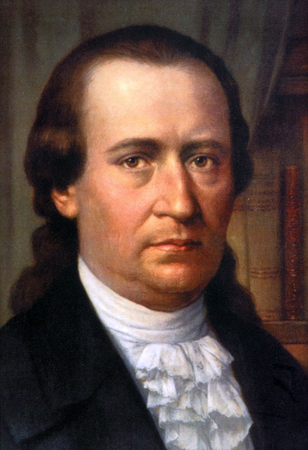Top Qs
Timeline
Chat
Perspective
Dositej Obradović
Serbian writer From Wikipedia, the free encyclopedia
Remove ads
Dositej Obradović (Serbian Cyrillic: Доситеј Обрадовић, Serbian pronunciation: [dɔsǐtɛːj ɔbrǎːdɔʋitɕ]; 17 February 1739 – 7 April 1811) was a Serbian writer, biographer, diarist, philosopher, pedagogue, educational reformer, linguist and the first minister of education of Serbia.[1] An influential protagonist of the Serbian national and cultural renaissance, he advocated Enlightenment and rationalist ideas, while remaining a Serbian patriot and an adherent of the Serbian Orthodox Church.
Remove ads
Life
Summarize
Perspective
Early life and education
Dositej Obradović was born Dimitrije Obradović, probably in 1739, in the Banat village of Čakovo, in the Habsburg monarchy, now Ciacova, in present-day Romania. From an early age, he was possessed with a passion for study. Obradović grew up bilingual (in Serbian and Romanian) and learned classical Greek, Latin, modern Greek, German, English, French, Russian and Italian.[2]
On 17 February 1757 he became a monk in the Serb Orthodox monastery of Hopovo, in the Srem region, and acquired the name Dositej (Dositheus).[3] He translated into Serbian many European classics, including Aesop's Fables. Having devoured the contents of the monastery library, he hungered for further learning. On 2 November 1760 he left the monastery of Hopovo, bound for Hilandar, Mount Athos.[4]


Further education and travel
In 1761 he went to Zagreb where he studied Latin. From 1761 to 1763 he was a teacher in a Serbian school in Kninsko Polje. For a brief period, he taught at a monastery in the Bay of Kotor before he was ordained as a priest by Vasilije Petrović. After falling ill, he returned to teach in Dalmatia in the village of Golubić near Knin.[4] He then went to Corfu where he studied Greek before going to Venice and then coming back to Dalmatia where he became a teacher again, in Plavno. He enrolled at the University of Halle in 1782, where he studied philosophy.[5]
In 1783, he transferred to the University of Leipzig and published his first work.[6] He was a student of Johann Eberhard who himself was a disciple of Christian Wolf. More than a third of his life was spent in Austria where Obradović became influenced by the ideas of Joseph II and the German Enlightenment. Additionally, he was an Anglophile and influenced by English educators, seeing England as the land of spiritual freedom and modern civilization.[7] In 1785 Obradović presented his books printed in Leipzig to the British Museum Library in London. These were the first modern Serbian books acquired by the British Museum Library.[8] Besides these countries, his forty-year travel journeys across Europe and Asia Minor also took him to Greece, Hungary, Turkey, Romania, France, Russia, England, and Poland.
Later life and death
At the time of the First Serbian Uprising (1804) Obradović was in Italy, where he published his pivotal poem Rise O Serbia (Vostani Serbije) in honor of Karađorđe Petrović and the insurgents. In Dositej's song, Serbia is pictured as a ‘sleeping Beauty’, asleep for centuries. The verses call upon her to wake up and give an example to her ‘sisters’, Bosnia, Herzegovina and Montenegro.[9] In 1807 Obradović moved to Belgrade[10] at the invitation of Karađorđe Petrović, to become, in the newly organized government, Serbia's first minister of education.[11] In 1809 he founded Higher School, the first higher education institution in Serbia that later developed into a university. The school was located in a two-story building in Zajrek, one of the oldest parts of Belgrade. The building now serves as the Museum of Vuk and Dositej.[12]
Obradović wrote first individual biographies and quickly the genre expanded to the form of biographical collection modelled on examples of Nepos, Suetonius, Plutarch, or Diogenes Laertius.
Obradović helped introduce to the Serbs the literature of certain western European countries.[13] He and Vuk Karadžić, whom Obradović influenced,[14] are recognized as the fathers of modern Serbian literature. Because the Serbian populace often suffered famine, Obradović also introduced potato cultivation to Serbia.
Dositej Obradović died in Belgrade, Serbia, in 1811. He was honored with a large funeral procession and buried in St Michael's Cathedral.[15] A monument to Obradović was errected by the Kalemegan park entrance in 1914. It was moved in 1930 to a prominent spot at the newly opened Academic Park, close to the University of Belgrade administration and governance building, where it still stands.[16][17]
Remove ads
In popular culture
- Pillow of my grave, a television miniseries based on the biography of Dositej Obradović and directed by Sava Mrmak, was produced in 1990 by the Serbian broadcasting service RTS.[18][19][20]
Works

- Slovo poučiteljno Gosp. Georg. Joakima Colikofera, Leipzig, 1774, 31 pp.
- Pismo Haralampiju, 1783.
- Život i priključenija D.O., Leipzig, 1783.
- Sovjeti zdravago razuma, Leipzig, 1784, 119 pp.
- Езопове и прочихъ разнихъ баснотворцевъ съ различни езика на славеносербски езикъ преведене [Aesop's and Various Other Fable-Formers', from Various Languages to Slavo-Serbian Translated] (in Serbian). Leipzig: Johann Gottlob Immanuel Breitkopf. 1788. 451 pp.
- Pesme o izbavleniju Serbije, Vienna, 1789, 4 pp.
- Sobranije raznih naravoučitelnih veščej, Pécs, 1793, 2 + 316 pp.
- Etika ili filozofija naravnoučitelna, Venice, 1803, 160 pp.
- Vostani Serbije, 1804.
- Mezimac, Budim 1818, 230 + 11 pp.
- Ižica, 1830
- Pisma, Budapest, 1829, 126 pp.
- Prvenac, Karlštat 1930, 17 + 168 pp.[21]
- Jastuk roda moga (lost), 1813
Translations
- Slovo poučitelno, 1784.
- Istina i prelest, (short story), 1788.
- Put u jedan dan, (short story), 1788.
- Aesop's Fables
- Hristoitija
- Bukvica
- Etika
- Venac
- Damon
- Ingleska izrečenija
See also
References
Sources
Further reading
Wikiwand - on
Seamless Wikipedia browsing. On steroids.
Remove ads

